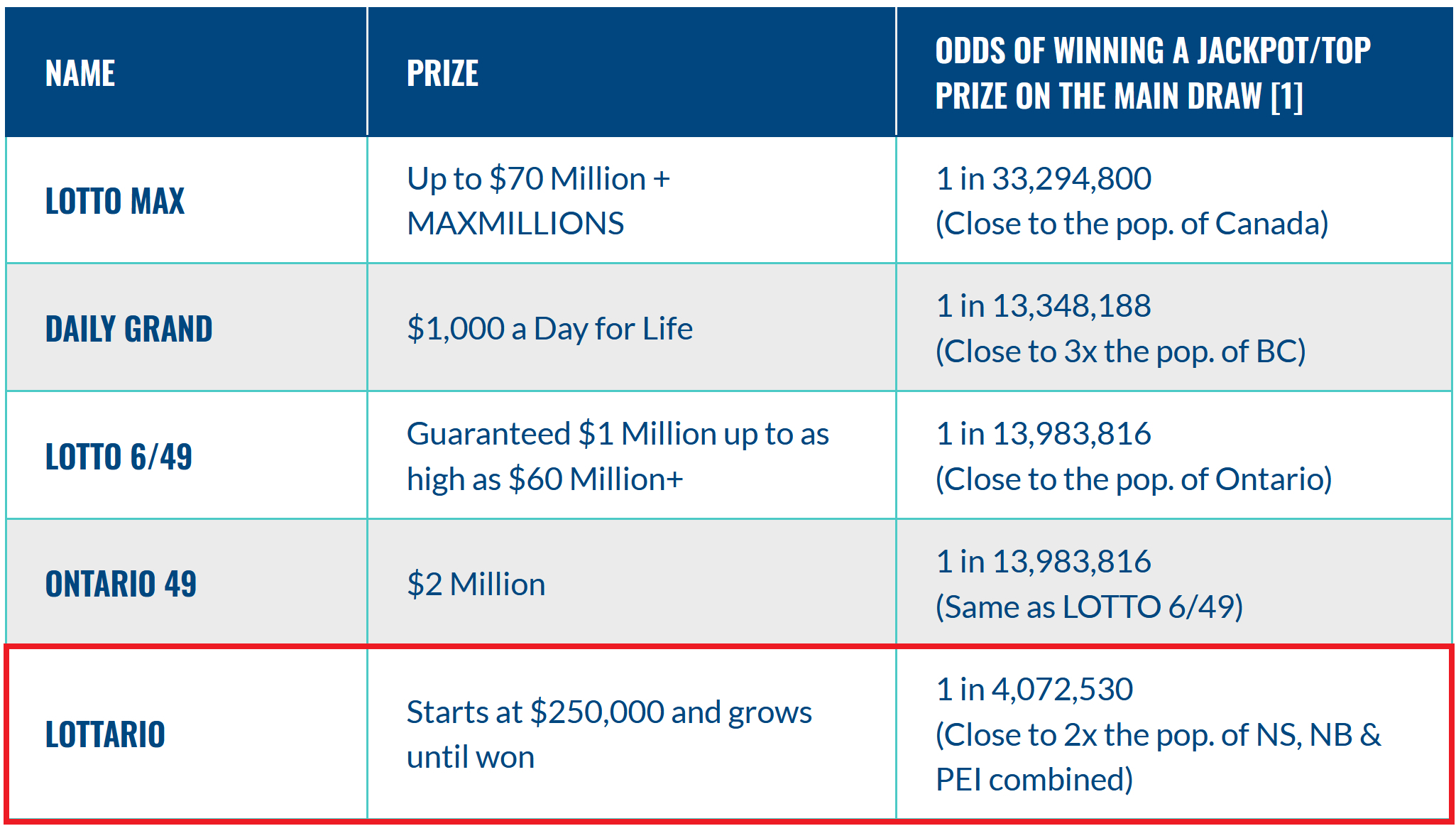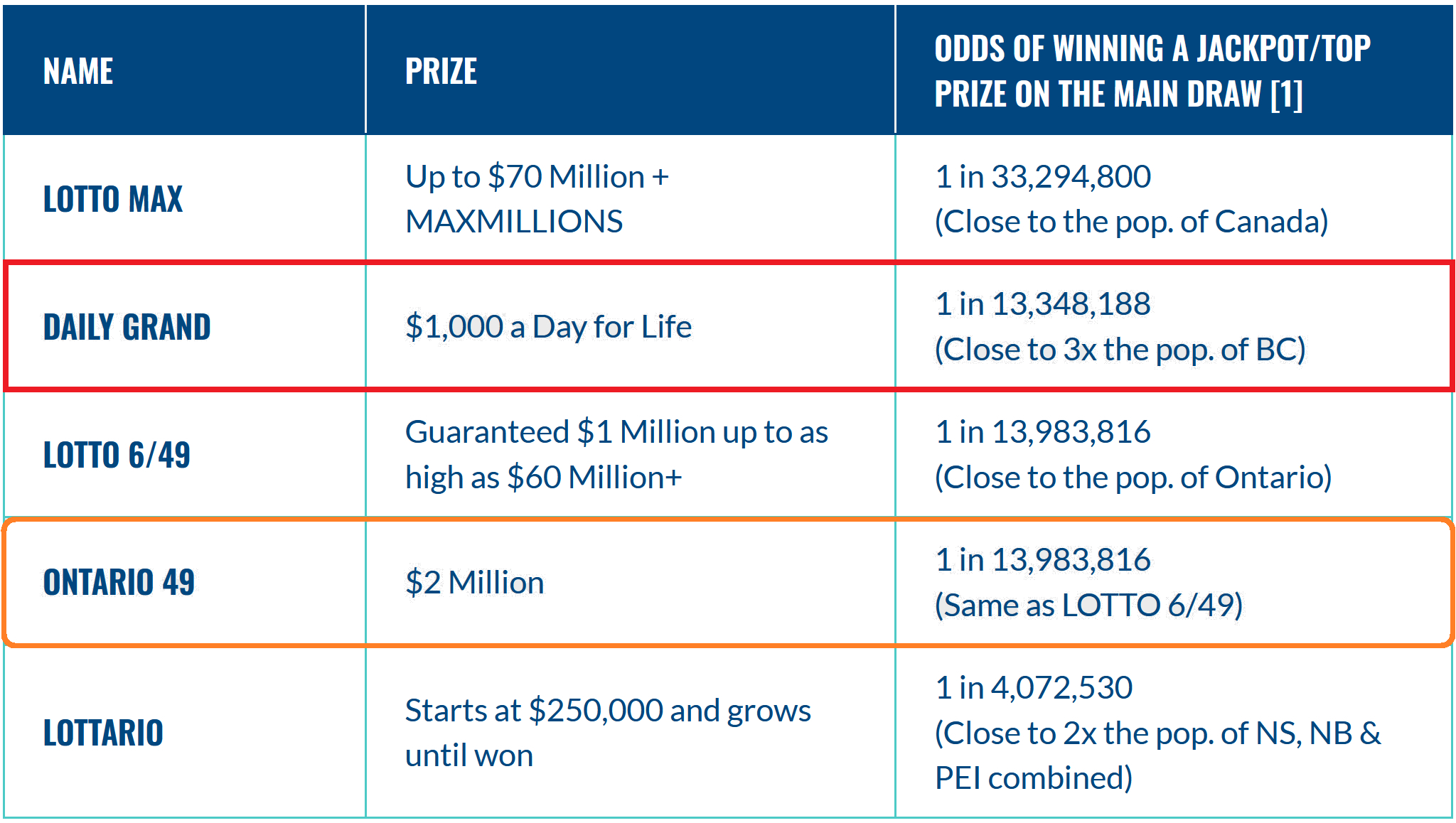Activity for Chgg Clou
| Type | On... | Excerpt | Status | Date |
|---|---|---|---|---|
| Comment | Post #287999 |
**3. _"Two tickets have 75% chance of winning, and 5 tickets 96.9% chance."_ How did you compute these rational numbers? 4. _"You can look this up yourself."_ I can? How? My table shows the odds for merely each play. It doesn't show odds for 10 plays of Lotto 649, 5 plays of DAILY GRAND, or 2 plays o... (more) |
— | about 2 years ago |
| Edit | Post #287998 |
Post edited: |
— | about 2 years ago |
| Comment | Post #287999 |
Thanks. I reworded my question 2. I didn't know I asked a question different from the one in my mind. I have 4 follow up questions please. **1. Please elaborate the following sentences? Please prove them mathematically? _"For small numbers of tickets and small chances of winning per ticket (like all ... (more) |
— | about 2 years ago |
| Edit | Post #287998 |
Post edited: |
— | about 2 years ago |
| Edit | Post #287998 |
Post edited: |
— | about 2 years ago |
| Edit | Post #287998 |
Post edited: |
— | about 2 years ago |
| Edit | Post #287998 |
Post edited: |
— | about 2 years ago |
| Edit | Post #287998 |
Post edited: |
— | about 2 years ago |
| Edit | Post #287998 |
Post edited: |
— | about 2 years ago |
| Edit | Post #287998 | Initial revision | — | about 2 years ago |
| Question | — |
How do I compare lotteries' chances of winning jackpot, when they differ in the maximum number of plays? >[However, there is one way to boost your chances of winning the lottery, says [Dr. Mark] Glickman: Your odds do improve by buying more tickets for each game.](https://www.cnbc.com/2019/05/31/harvard-prof-on-odds-of-winning-multiple-lotteries-like-these-people.html) 1. Do the odds below factor in... (more) |
— | about 2 years ago |
| Comment | Post #287973 |
I don't need to define "d", because DanielWainfleet did so in his answer on StackExchange. (more) |
— | about 2 years ago |
| Edit | Post #287973 |
Post edited: |
— | about 2 years ago |
| Edit | Post #287973 | Initial revision | — | about 2 years ago |
| Question | — |
If a changes to b, then doesn't a + d = b? Why a(1 + d) = b? My 9 year old does not grok DanielWainfleet's answer. How can we intuit why percent change divides the difference by the original number, NOT the new number? >If a changes to b then $\color{red}{a(1+d)=b}$ so $d=(b/a)−1=(b−a)/a$. Why $\color{red}{a(1+d)=b}$? Why can't this be $\color{limegreen}... (more) |
— | about 2 years ago |
| Edit | Post #287959 |
Post edited: |
— | about 2 years ago |
| Edit | Post #287958 |
Post edited: |
— | about 2 years ago |
| Edit | Post #287972 |
Post edited: |
— | about 2 years ago |
| Edit | Post #287972 |
Post edited: |
— | about 2 years ago |
| Edit | Post #287972 |
Post edited: |
— | about 2 years ago |
| Edit | Post #287972 | Initial revision | — | about 2 years ago |
| Question | — |
How can school children intuit why over 100, D is larger? But under 100, D% is larger? I can prove the Rule of 100 algebraically, below. But my school kids are hankering after intuition, and a plainer explanation. > > > ## Follow the Rule of 100 > > Should discounts be percentages or absolutes? > > Consider a \\$150 blender. Should you o... (more) |
— | about 2 years ago |
| Edit | Post #287958 |
Post edited: |
— | about 2 years ago |
| Edit | Post #287958 |
Post edited: |
— | about 2 years ago |
| Comment | Post #287960 |
Thanks. I edited my post to add the lottery cost. Can you update your answer please? "-1 because that really should have been obvious." Aren't you punishing posters who have dyscalculia, and are unskilled at math? (more) |
— | about 2 years ago |
| Edit | Post #287959 |
Post edited: |
— | about 2 years ago |
| Edit | Post #287959 |
Post edited: |
— | about 2 years ago |
| Edit | Post #287958 |
Post edited: |
— | about 2 years ago |
| Edit | Post #287959 |
Post edited: |
— | about 2 years ago |
| Edit | Post #287959 | Initial revision | — | about 2 years ago |
| Question | — |
At what jackpot minimum is playing Lottario rational?  I screenshot https://www.playsmart.ca/social-hub/ironing-out-lottery-odds. >The Main Jackpot: Starts at $250,000 and grows until it’s won. There is no capped maximum amount to the jackpot. >Two chances to win per \\$1 play... (more) |
— | about 2 years ago |
| Edit | Post #287958 |
Post edited: |
— | about 2 years ago |
| Edit | Post #287958 |
Post edited: |
— | about 2 years ago |
| Edit | Post #287958 |
Post edited: |
— | about 2 years ago |
| Edit | Post #287958 | Initial revision | — | about 2 years ago |
| Question | — |
Isn't Ontario 49 always worse than Daily Grand?  The table above fails to disclose that Daily Grand's top prize is >Annuity of \$1,000 a day for life or a single lump sum cash payment of \$7,000,000 [emphasis mine]. Doesn't Daily Grand's - more moneyed lump sum (\$7M >... (more) |
— | about 2 years ago |
| Edit | Post #287188 |
Post edited: |
— | over 2 years ago |
| Edit | Post #287188 | Initial revision | — | over 2 years ago |
| Question | — |
How can 3/1 ≡ 1/(1/3), when left side features merely integers, but right side features a repetend? On one hand, I know that algebraically, $\dfrac{3}1 ≡ \dfrac{1}{\color{red}{1/3}}$. On the other hand, they differ in practice, not least because $\color{red}{1/3}$ contains 3 as the repetend. For example, if a scrap of physical material must have a 3:1 ratio and a length of 3 m, then I shall mak... (more) |
— | over 2 years ago |
| Edit | Post #286728 | Initial revision | — | almost 3 years ago |
| Question | — |
Isn't "any, some, or all" redundant? Why not write just "any"? Please see the title of this post. In the following quotations, what changes — if anything — if you replace "any, some[,] or all" with just "`any`"? Don't these authors need just "`any`"? I deliberately picked books written by mathematicians, because math requires logic and precision. 9. Yve... (more) |
— | almost 3 years ago |
| Edit | Post #281006 |
Post edited: |
— | almost 3 years ago |
| Edit | Post #281006 |
Post edited: |
— | almost 3 years ago |
| Edit | Post #281006 |
Post edited: |
— | almost 3 years ago |
| Edit | Post #280847 |
Post edited: |
— | over 3 years ago |
| Edit | Post #280847 |
Post edited: |
— | over 3 years ago |
| Comment | Post #285447 |
thanks for your reply. I corrected my post. I don't want 0 as the answer. As an investor, I covet exposure to AT LEAST 1 water ETF. Feel free to edit my post. I afraid that if I generalize or broaden my question into a pure math problem, I won't understand it! (more) |
— | over 3 years ago |
| Edit | Post #285447 |
Post edited: |
— | over 3 years ago |
| Edit | Post #285447 | Initial revision | — | over 3 years ago |
| Question | — |
How to deduce which ETF is redundant? a of ETF1's holdings in ETF3, a of ETF2 in ETF3, b of ETF1 are in ETF2, b of ETF2 in ETF1. According to https://www.etfrc.com/funds/overlap.php, 1. 47.2% of FIW's 37 holdings $\in$ AQWA's 38 holdings. 2. 47.2% of PHO's 36 holdings $\in$ AQWA. 3. 77.8% FIW's holdings $\in$ PHO. 4. 77.8% PHO's holdings $\in$ FIW. My two goals. I must 5. buy $\ge 1$ Water ETF, such as the 3 a... (more) |
— | over 3 years ago |


















